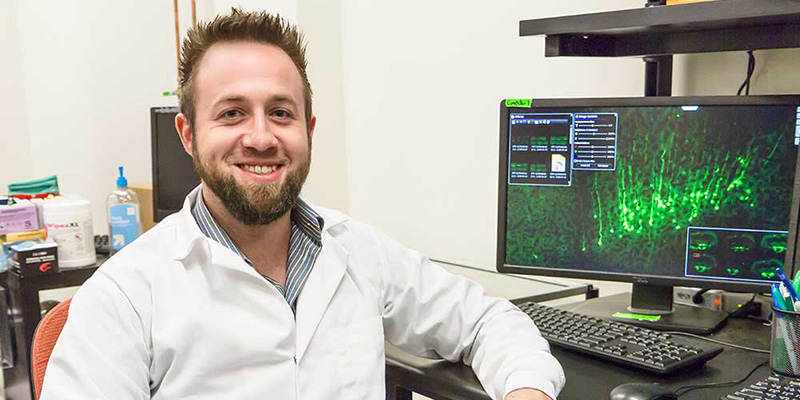Patrick Ganzer, PhD, Receives the King’s College Leo Award
June 27, 2019

Patrick Ganzer, PhD, former research fellow at the Texas Biomedical Device Center (TxBDC) was presented with the King’s College Leo Award earlier this month. The Leo Award is presented to alumna within 15 years of their graduation who have demonstrated outstanding achievement in their professional or community activities.
Dr. Patrick Ganzer ’08 graduated Summa Cum Laude from King’s with a dual degree in Neuroscience and Psychology. He continued on to earn his Ph.D. in Biomedical Engineering and Science from Drexel University in 2013 and completed his post-doc at The University of Texas Dallas.
“I am honored to receive the 2019 King’s College Leo Award” said Ganzer. “Thanks to my friends and family who support me and let me chase my dreams.”
While at TxBDC, Dr. Ganzer made significant contributions to research dedicated to the use of vagus nerve stimulation as a possible therapy for brain and spinal cord injury patients. In 2015, Ganzer won a best paper award from the International Spinal Cord Repair (ISCORE) group for work that uses VNS paired with rehabilitation to enhance neuroplasticity — the changing of the nervous system in response to new experiences. The study found that VNS therapy with rehabilitation helped recover 75 percent more forelimb strength than rehabilitation alone after a cervical spinal cord injury.
“Dr. Ganzer was recruited to the Texas Biomedical Device Center at UT Dallas based on his Ph.D. work at Drexel” said Dr. Robert Rennaker, assistant director of the Texas Biomedical Device Center. “His research at TxBDC resulted in significant scientific findings that have the potential to help thousands of Americans suffering from permanent disabilities due to spinal cord injury. Based on his findings, TxBDC will be performing a clinical trial with individual living with spinal cord injuries next year.”
Ganzer serves as a Principal Investigator of Bioelectric Medicine at Battelle Memorial Institute in Columbus, Ohio, the world’s largest non-profit research organization. His scientific work is currently being translated to clinical trial applications to help patients suffering from neural disease.

Q&A with Dr. Ganzer
How did your time at TxBDC help prepare you for your current job?
Dr. Mike Kilgard and Dr. Rob Rennaker gave me a significant amount of freedom to pursue high-risk and high-reward scientific projects at TxBDC. Together with our scientific teams, we developed new knowledge pertinent for the development of therapies for spinal cord injury, stroke, and peripheral nerve injury. Mike and Rob are fantastic mentors in all thing’s science, writing, and team management. My experience at TxBDC was exceedingly valuable in preparing me for my current job.
Did you learn any skills in particular that you still use in your current position?
I learned several critical skills, mainly in 3 main domains, during my time at TxBDC with Dr. Kilgard and Dr. Rennaker: 1) Running a lab is similar to running a business. Each project has its own set of scientific goals, team members, financials, and risk mitigation strategies. While at TxBDC, I led or assisted several neurotechnology projects. I now lead and assist several neurotechnology projects and labs in my current position at the Battelle Memorial Institute. Almost every day at Battelle, I use the scientific, team management, and risk mitigation skills I developed at TxBDC. 2) Technical writing skills are critical for success in science. We wrote several grants together at TxBDC and landed significant funding for further technology development and preclinical testing. I use the writing skills I developed with Mike and Rob all of the time. 3) Appropriate scientific program development is essential for creating projects that meet your group’s mission. It’s easy to get distracted in science, and research topics that don’t meet your program’s core needs. Preclinical scientific work from TxBDC is now being translated to multiple clinical trials to help patients overcome physical disabilities. This is one of the most impressive and challenging parts of what Mike, Rob, and TxBDC do. At TxBDC, I learned how to develop scientific programs that balance both assessing mechanisms and generating translational knowledge for new clinical applications. I use these scientific program development skills all of the time at Battelle to develop new neurotechnology solutions that meet our group’s mission of helping patients.
What advice do you have for current students that plan to continue their scientific research after graduation?
Shoot for the stars. You only live once!
